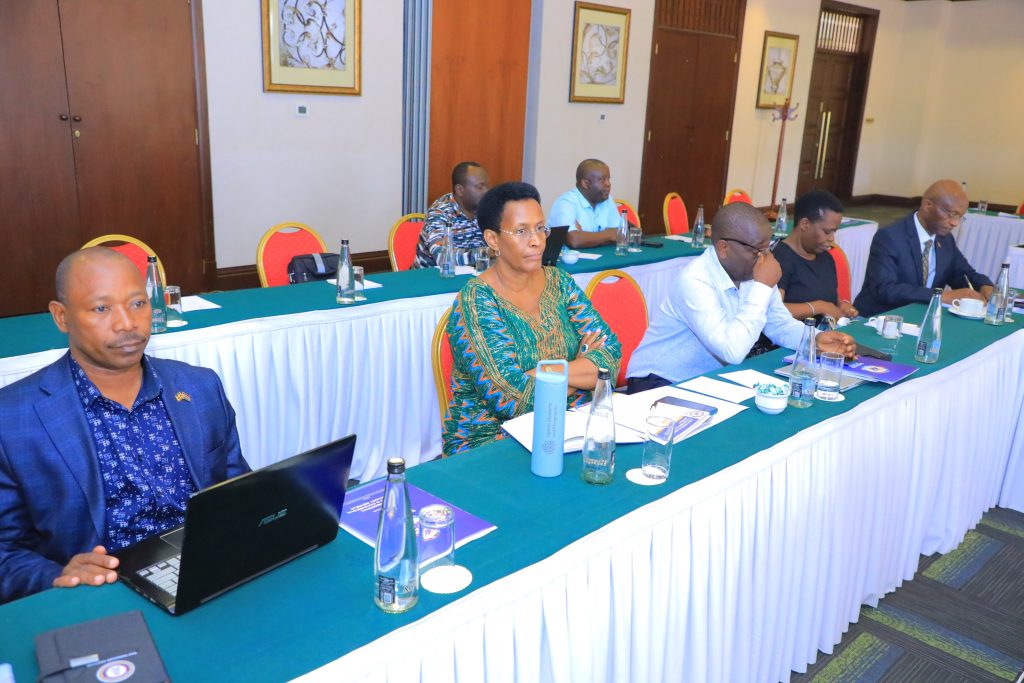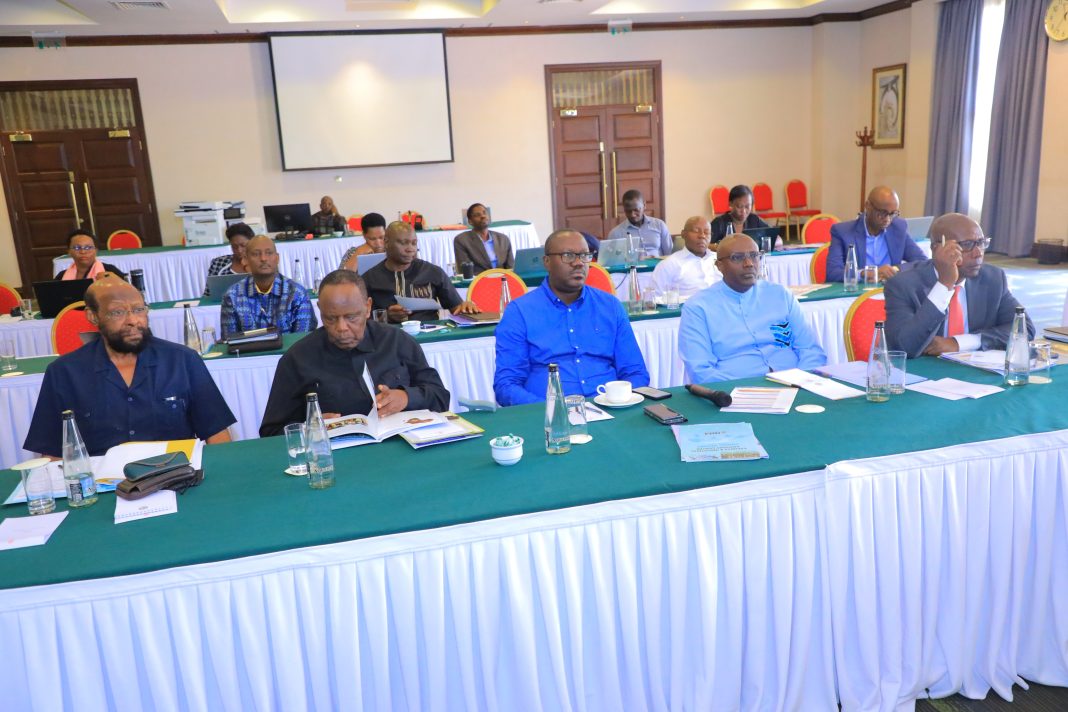Uganda has a trade surplus with the Democratic Republic of Congo (DRC) amounting to $53.07 million (Ush208.9 billion), according to latest figures presented by Ugandan Ambassador Alhaji Farid Mansoor Kallisa, Head of Mission, Kinshasa.
The figures were presented at the Ring States Joint Regional Economic & Commercial Diplomacy Retreat happening at the Serena Hotel, Kigo. Kallisa said the surplus stands at $53.07 million, indicating Uganda’s dominant position in the bilateral trade. He said that this has been facilitated by recent security improvements enabled by UPDF operations.
Uganda’s exports to the DRC include cereals, vegetable oil, refined petroleum oil, and salt, among others. The surplus also highlights the potential for further trade growth between the two nations, with opportunities for Ugandan businesses to expand their market share in the DRC.
Amb. Kallisa said the Uganda Mission in Kinshasa aims to build on this success through strategic engagement and trade promotion initiatives. This revelation is also corroborated by the Ministry of Finance Performance of the Economy report, which shows that DR Congo receives more exports from Uganda than any other East Africa Community (EAC) member state.

Ambassador Ronnie Balya, the head of the Ugandan Mission in Juba also reported $41.68 million (Ush164 billion) trade surplus in favour of Kampala between Uganda and South Sudan. This comes as the security situation in South Sudan continues to normalize, following the signing of the Revitalised Agreement on the Resolution of the Conflict in 2018.
“As we move forward, our focus should be on joint venture business in various areas like industry, agriculture, ICT, services – like health, education, banking, real estate, hospitality, tourism, and infrastructure development,” said Balya.
Trade between the two nations has shown significant growth, with Uganda’s exports to South Sudan increasing from USD 225.28m in 2015/16 to USD 546.43m in 2021/22. South Sudan’s exports to Uganda also rose from USD 4.83m to USD 15.59m during the same period.
“Now that peace has returned to South Sudan, I encourage our people in Uganda to embrace this opportunity to expand trade and investment,” Amb. Balya said. However, challenges persist, including non-tariff barriers, tariff barriers, and infrastructure limitations.
The Embassy of Uganda in Juba is working to address these issues, including the establishment of a joint mechanism for product verification and the easing of taxation on imported goods. “The awaited Joint Permanent Commission (JPC) meeting will go a long way in addressing these concerns,” Ambassador Balya said, adding: “We shall do more market intelligence/market survey on various opportunities.”

Uganda’s High Commissioner to Rwanda, Gen (Rtd) Robert Rusoke said Uganda’s exports to Rwanda have shown significant growth, increasing from UGX 400M in 2020 to UGX 110.7B in 2023, while Rwanda’s exports to Uganda have also risen from UGX 36B to UGX 45.1B during the same period.
Key Ugandan exports include pineapples, Irish potatoes, mangoes, and sorghum, while Rwanda’s main exports include sugar, cement, and maize flour. After three years of strained relations, Uganda and Rwanda have revitalized their bilateral ties, paving the way for increased trade and economic cooperation.
The thaw in relations comes after a consultative meeting between the two nations culminated in the signing of an MOU on political and diplomatic consultations in January 2022. The MOU established a framework for regular Ministerial Diplomatic and Political consultations every six months to address any contentious issues and promote warm bilateral relations.
The Joint Permanent Commission (JPC), which had stalled for over a decade, was subsequently revived in March 2023, paving the way for enhanced economic engagement. The Uganda High Commission in Rwanda has played a crucial role in promoting Economic and Commercial Diplomacy, facilitating trade and investment between the two nations. The Mission has also worked to address challenges faced by traders, including the reopening of border points and the simplification of customs procedures.
Uganda’s High Commissioner to Tanzania, Col (Rtd.) Fred Mwesigye, highlighted the significant growth in trade between the two nations, with Uganda’s exports to Tanzania increasing by 16.7% annually over the past 27 years.
Key export sectors from Uganda to Tanzania include minerals, coffee, and agricultural produce, while Tanzania’s main exports to Uganda include rice, gold, and cereals. Despite the progress made, several challenges persist, including non-tariff barriers, infrastructure limitations, and social and cultural issues.
To address these challenges, the two nations have undertaken various mitigation measures, including continuous engagements under the Joint Permanent Commission (JPC) framework, promotion of regional integration, and organization of trade missions and business forums. Col. Mwesigye said opportunities for bilateral trade expansion include market expansion, competitive analysis, business promotion, strategic partnerships, and infrastructural connectivity.
Both countries have committed to full implementation of the East African Community (EAC) Common Market and Single Customs Protocol to improve trade relations. The High Commission of Uganda in Tanzania remains dedicated to promoting economic diplomacy and facilitating trade between the two nations.

The Uganda Embassy in Mogadishu announced significant trade and remittance flows between Uganda and Somalia. According to Ambassador Prof. Sam Tulya-Muhika, Head of Mission, Ugandans working in Somalia remit between $50,000 to $60,000 daily, totaling approximately $1.5 million to $1.8 million monthly.
He said the Embassy has established a mechanism for regular meetings with the diaspora to encourage Foreign Direct Investment (FDI) and is negotiating with money transfer services like Dahabshiil, Taj Services, and Jubaland Transfer to reduce transaction costs.
Over 25 private security companies in Somalia employ Ugandans, with 2,500-3,000 workers in the sector. Prof. Sam Tulya-Muhika, said the Embassy has approved 250 job orders under the External Employment Management Information System (EEMIS).
Somali businesses in Uganda operate in remittances, oil and gas, cafes, restaurants, air travel, and banking. The Embassy is promoting Ugandan coffee and exploring economic and commercial diplomacy opportunities.
On his part, Evans Aryabaha, Charge d’Affaires at the Uganda High Commission in Nairobi highlighted Uganda’s efforts to increase its exports to Kenya despite facing various challenges.
Aryabaha noted that Uganda’s exports to Kenya have been growing, with tea, milk, and corn being the top exports.
However, Aryabaha pointed out that Uganda’s exports to Kenya still face tariff and non-tariff barriers, including excise duties, levies, and restricted market access. He emphasized the need for scrupulous legal and policy coherence to address these challenges.
Despite these challenges, the Mission has made efforts to promote economic and commercial diplomacy, including organizing trade and tourism promotion events, coordinating benchmarking tours, and engaging in joint verification missions. He highlighted the success of the Mission’s efforts, including the signing of a tripartite agreement on the importation of refined petroleum products and the refurbishment of Uganda House in Nairobi, which is expected to earn significant non-tax revenue.
Aryabaha emphasized the importance of allocating and maintaining a budget for economic and commercial diplomacy promotion, noting that Kenya is Uganda’s strategic partner and top trading partner in the region. He called for periodic reviews to assess progress and improve performance in promoting economic and commercial diplomacy.
Amb. Elly Kafeero Kamahungye, Ag. Director Regional and International Economic Affairs at the Ministry of Foreign Affairs emphasized the importance of ECD in achieving Uganda’s development goals. He said the ambassadors have been equipped with skills to promote economic and commercial diplomacy (ECD) as a key driver of national development and regional integration.
“Economic diplomacy involves using government resources to promote the growth of a country’s economy by increasing trade, promoting tourism and investments, and technology transfers,” Amb. Kamahungye explained. He highlighted the role of MOFA and its missions abroad in promoting Uganda’s interests, attracting foreign direct investment, promoting tourism, and increasing exports.
“We need to be proactive and business-oriented, seeking to satisfy the needs of companies and promote Uganda as a destination for investment, tourism, and trade,” Amb. Kamahungye urged commercial diplomats. The retreat aimed to provide a platform for commercial diplomats to share experiences, best practices, and challenges in promoting ECD.
Participants discussed various topics, including the importance of market access, compliance with market standards, and leveraging regional integration to promote trade and investment.























